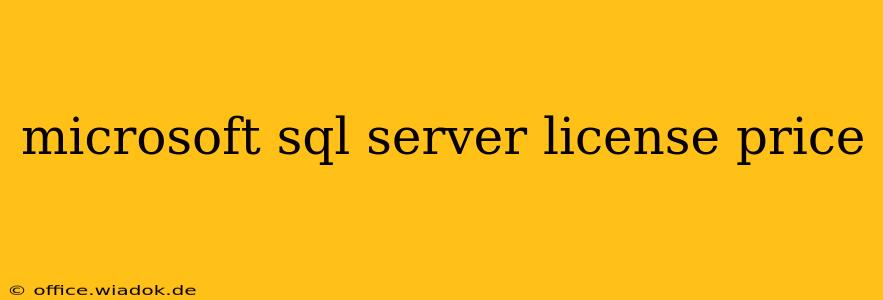Determining the exact price of a Microsoft SQL Server license isn't straightforward. Unlike a simple "one-size-fits-all" price tag, the cost depends on several factors, making it crucial to understand the different licensing models and associated costs before making a purchase. This comprehensive guide breaks down the complexities of SQL Server pricing to help you navigate the process effectively.
Understanding Microsoft SQL Server Licensing Models
Microsoft offers several licensing models for SQL Server, each with its own pricing structure:
1. Core-Based Licensing:
This model is the most common for new deployments. You license SQL Server based on the number of cores in the servers where the software is installed. The price per core varies depending on the edition (Standard, Enterprise, etc.) and the specific licensing agreement (e.g., Server & CAL, or just Server).
- Standard Edition: Generally, the more affordable option, suitable for smaller deployments and applications with less demanding performance requirements.
- Enterprise Edition: The most feature-rich and powerful edition, designed for large-scale enterprise applications and demanding workloads. It commands a significantly higher price per core.
- Web Edition: Designed for hosting web applications. Often the most cost-effective for that specific use case.
- Express Edition: A free edition with limitations on features and scalability. Suitable only for development and small-scale deployments.
Key Considerations:
- Number of Cores: The more cores your server has, the higher the licensing cost.
- Edition: Enterprise Edition is substantially more expensive than Standard Edition.
- Software Assurance: This optional program provides benefits like access to newer versions, technical support, and training. It adds to the overall cost.
2. Client Access Licenses (CALs):
CALs grant individual users or devices the right to access a SQL Server instance. They're required alongside core-based licensing in the Server & CAL licensing model. The price of CALs varies depending on the edition of SQL Server they're associated with.
3. Virtualization Licensing:
Licensing SQL Server in virtualized environments introduces additional considerations. Microsoft’s licensing rules for virtual environments can be complex and require careful attention to avoid overspending or non-compliance. Different rules apply to different scenarios, including virtual machines (VMs) that are highly mobile or consolidated.
4. Subscription Models:
Microsoft also offers subscription-based licensing options through its cloud platforms like Azure. This can simplify licensing and provide predictable monthly costs, but the pricing is distinct from the on-premises licensing models outlined above.
Factors Affecting the Price
Beyond the core licensing model, several other factors influence the total cost:
- Edition of SQL Server: Enterprise Edition is significantly more expensive than Standard or Web Edition.
- Number of Cores: As mentioned earlier, this directly impacts the licensing cost.
- Software Assurance: The addition of Software Assurance significantly increases the cost.
- Client Access Licenses (CALs): The number of CALs needed will affect the overall price.
- Virtualization Rights: Licensing in a virtual environment can add complexity and cost.
- Support and Services: Additional support contracts or services will add to the expense.
Getting a Precise Quote
The only way to get a precise quote for your specific needs is to contact a Microsoft licensing specialist or a certified Microsoft partner. They can assess your requirements and provide a tailored quote based on your environment, usage, and licensing preferences. Remember to clearly detail your infrastructure, planned usage, and any virtualization plans to get the most accurate pricing information.
Conclusion
The price of a Microsoft SQL Server license isn't a simple number. It's a complex equation involving several variables. Understanding the licensing models, editions, and additional considerations is crucial for making an informed decision and optimizing your licensing costs. Consulting with a licensing expert is highly recommended before making any purchase.

